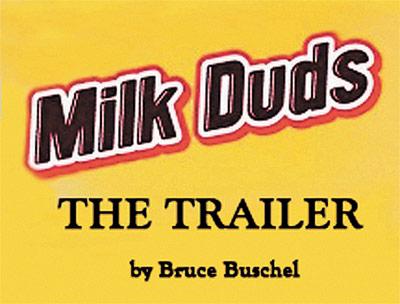Milk Duds: The Trailer
Milk Duds: The Trailer

ACT ONE: Boy Meets Candy
fade in: Popcorn, large
cut to: Milk Duds, box
slo-mo: misshapen spheres
cascade onto buttery maize
intimations of endless bounty
hand disappears into bag (MOS)
scoops up a lovely melange
dark balls and white fluff
sweet chocolate and salty corn
match made in casting kitchen
VO: “The journey has begun —
as American as Shinnecocks
as rich as Milton Hershey
as suspenseful as a Damon
and/or Affleck spy thriller.”
ergo: born to be a cash cow
open wide and say moo-lahhh
ACT TWO: Boy Loses Candy
rack focus: one odd Milk Dud
neither caramel nor gooey
but hard and malty and round
freeze frame: it’s a Whopper!
guest cameo or McGuffin?
halfway through the bag
inciting insight is cited:
you are halfway through the bag!
VO: “Nothing lasts forever.”
tears appear in blue eyes
one tear breaks loose, rolls
ECU: price tag — $2.50
reverse angle: bottle of water
Clint squint foreshadows violence
swish pan: dream sequence
Chekhov’s gun in Bunuel’s eye
man on iPhone shot thru head
ACT THREE: Boy Gets Candy
angle on: a fistful of Popcorn
cue Ennio Morricone sound track
VO: “In a world of salt and
unpopped kernels, every man
searches for the last Milk Dud.”
montage: paper bag. beating heart.
great plains. German shepherd.
cymbals crash as the last Milk Dud
is found in the bag’s darkest corner
EXT: dissolve to mouth.
INT: dissolve in mouth. le fin.
closing credits roll:
special thanks to Hershey, PepsiCo
Syd Field, Anton Chekhov, Malpaso
Ennio Morricone, George Wallace
Hitch, Luis Bunuel, 2 Weinsteins
Voice-over by Don LaFontaine
Written on location, Bridgehampton, New York.
No candy was harmed during the making of this poem.
